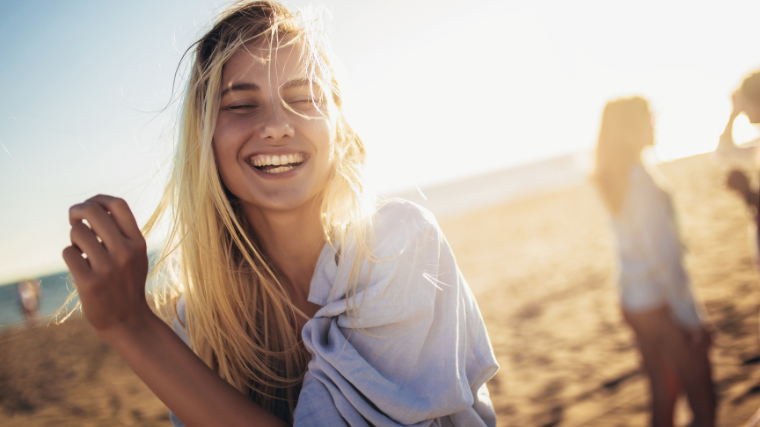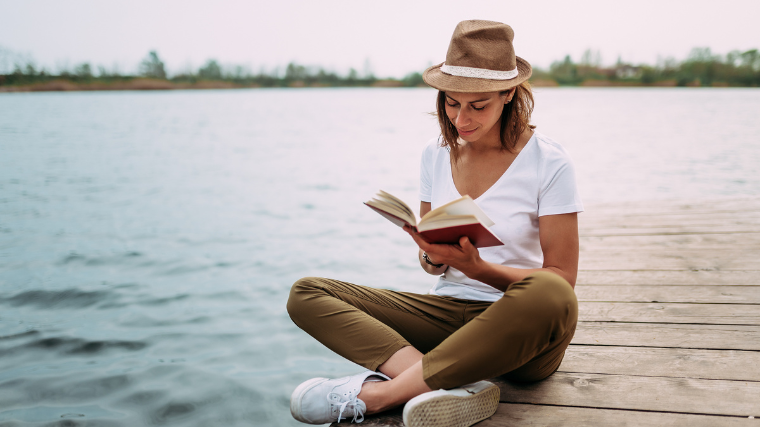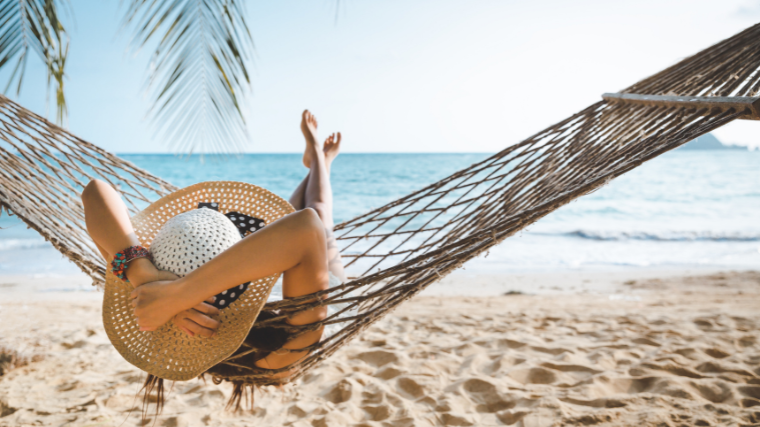Why aren’t we able to regenerate during our holiday?
If we don’t get enough sleep, tend to work overtime and are in constant stress almost every day during the rest of the year, even two weeks of holiday leave may not be enough for us to fully recover. It will not be enough to recover in physical and mental terms. Unfortunately, very often we mobilise ourselves to get as much done as possible and burn the candle at both ends.
As a consequence, we are exhausted; when our long-awaited holiday leave is about to begin, our body is so tired that it needs to react. That is why so many people show cold-like symptoms, have digestive problems, sleep disorders, migraines or neuralgia on the first days of their holiday leaves.
Our body needs time to slow down and for the stress hormones to go down. If we start our long-awaited holiday leave with an illness, it’s only natural that our frustration will go up. Especially if we have spent a lot of money on the holiday and we know that we won’t be able to afford another one any time soon.
We all differ in terms of mental- and physical resilience, and we have different tolerance to lack of sleep, being under pressure, working in poor physical- or mental conditions. Thus, we have different needs when it comes to the amount and type of rest we require to recharge. How to do it?

How to regenerate during holiday?
- Do not see your holiday as another target to achieve: seeing a greater number of beautiful places, historic monuments or beaches will not help you regenerate more; usually, the effect will be just the opposite! Constant rush, living under pressure, tight schedules and focusing on meeting the deadlines will be the exact same thing you have at work and what you want to get away from.
- Think who you want to spend your long-awaited holiday with. Travelling with others requires constant trade-offs, both when selecting the destination and accommodation, and when agreeing on the daily activities. If you are not assertive enough, unable to set your boundaries or communicate your needs and wants in an open manner, the only thing you are going to get from your trip is frustration, dissatisfaction or even conflicts, rather than relaxation! You will be more tired when you return than you had been when you left... It may happen that a trip together with friends will regretfully be the end of the friendship. Just because we have an excellent time together for a few hours during parties does not necessarily mean that we will have as great a time when spending together a few days.
- Have a heart-to-heart with your partner, your kids or your friends to find out what each of you would like most. Plan your trip so that each of you can satisfy at least some of his or her needs and have some me-time, if only for an hour a day. Multiple hotels offer all types of animations for kids and adults because we all have different needs.
- Avoid accumulating tasks before your holiday leave. Many people get sick during the first days from their arrival to their holiday destination. A doctor told me that we usually get sick at the beginning of our holiday because we overextended our body and mind by working too much before the holiday leave.
- The duration of a holiday leave that will really help you regenerate is individual. Some will recover better by taking shorter holidays more frequently – it doesn’t have to be a far-away trip, it can be extra days-off at home. Others will need at least two weeks to rest and let their minds get away from the everyday reality.
- Eat healthy and in moderate amount. Are excessive amounts of alcohol, highly-processed food and random snacks really something that will help you regenerate? Returning from your holiday with some extra pounds will probably not have a positive impact on your self-esteem and on your well-being.
- Do not follow the latest fads when choosing your holiday destination or type of activity. We all have very different needs, likes and dislikes. Just because something gives an “energy kick” to your friend, it doesn’t necessarily mean that you will like it too.
- Before you start planning your holiday, take a moment and think what helps you relax most. Do you feel more alive by spending time with nature, meeting other people or staying active? Maybe you enjoy aesthetic experiences, being close to art and culture? Do you recharge more effectively by undertaking activities that give you an adrenaline kick or do you rather seek the silence as an antidote to a stressful life? Listen to your own needs. Take a moment to think what you need more at this point in your life – do you need new experiences or would you rather go to a place you know and love?
- Use your holiday entitlement on a regular basis Many people have tens of overdue holiday leave days: learn to use that privilege and plan a rest regularly.
- Even planning your holiday can be exciting. You can use your imagination and travel to some wonderful destinations before you even set your foot there. Travel blogs written by people who have knowledge and passion that you can read between the lines can be helpful when planning a trip. The blogs contain tons of useful information and inspirations that make travelling easier.
- Focus on your experiences rather than on spending your holiday in a fancy hotel at an expensive resort or pursuing fashionable sport activities. Spending more money on your holiday does not translate into a better rest. For more on that topic, read my article Buy experiences, not things.
- Limit your use of the Internet and the social media. Some people rest best when they give themselves digital detox in that they unplug completely from the social media, the news service platforms, all types of portals or messengers.
- Getting good-quality sleep is indispensable for our minds and bodies to work properly. It is not without a reason that sleep deprivation is one of the most debilitating tortures. Rather than getting the most of every day of your holiday, allow yourself enough sleep. For most people that means sleeping around 8 hours a day. Give yourself the gift of enough sleep, even if it means less time for partying or sightseeing.
- Give yourself the time to switch to the holiday mode. During the first day of your holiday leave, your body will need to adapt to the new way of functioning and to the new surroundings, even more so when you travel to a different climate zone and a different time zone. If the travel to our destination was long and we felt anxious on the way (for example, because there was a massive delay), the stress hormones will not go down once we get there. Do not expect that you will get an energy kick right from the very beginning of your holiday. Some people admit that during the first week of their holiday leave they are only able to get a physical rest. They have not unplugged from work yet. The thoughts in their heads keep running and they worry that there may be some problems at work while they are on holiday.
- Don’t let the weather take you by surprise! The more meticulous your planning and the more you psych yourself up for perfect weather conditions, the more frustrated you will be when the weather is bad and you will need to give up some of your plans, such as hiking in the mountains, because it is raining in torrents. Have a plan B before you leave on your trip – think what you can do when the weather runs foul. I always bring an e-book reader with me and download audiobooks to my mobile so that I can always have some good reads with me. Having access to a database of excellent e-books will be of use and it’s worth taking advantage of the Legimi offer with MultiLife. I also check nearby museums, art galleries or other attractions that I can visit, regardless of the weather.

How about a solo trip?
People can be motivated to travel alone because they will not have to adapt to their family members or friends. Especially when there is not a single person in their closest circle who has similar needs, temper or interests.
You can better learn your own strengths and weaknesses when travelling alone. You can test your skills, your emotions and how you react in real life. Travelling alone helps you overcome self-limiting beliefs and reinforce a sense of empowerment, or having an influence on your own life. It helps you believe in your own effectiveness and resourcefulness. And those qualities lie at the heart of a stable sense of self-worth. It is of particular importance for people who have a low self-esteem and who have a tendency to dramatise, or assume the worst-case scenario from the very beginning.
Facing difficult situations strengthens your resilience. It forces you to be more flexible and to leave your comfort zone. It will be conducive to your personal development and to building a stable self-esteem that is based on a realistic perception of yourself.
Travelling alone gives you the opportunity to find out more about yourself.
You do not need to travel to the other hemisphere to benefit from solo trips. For some people, even a solo trip to another town or city will be a challenge that will give them enormous stress and uncertainty.
However, if you really do not feel like travelling alone but only want to try it because it is trendy, please do not do it. There are plenty of celebrities and regular people who sing praises of travelling alone in their travel blogs or on their profiles in the social media. We do, however, have different needs and the things that make us happy vary.
The need to make your own decisions and to accept positive and negative consequences of your decisions (without relying on some else’s decisions and blaming them for their consequences) helps lower the fear of taking responsibility for your own choices and of making mistakes. It is an enormous challenge particularly for people who have a dependent personality disorder.

